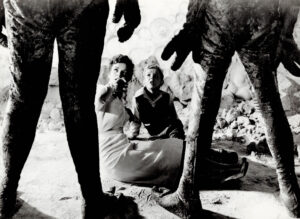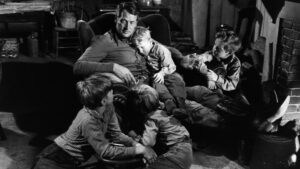Il Cinema Ritrovato 2022 rediscovering childhood

“”It was during that terrible time and I had seen enough to feel profoundly upset and distraught; […] I thought: ‘now children really are watching us!’ It was children, the shoeshine boys, that helped me make sense of it all, to understand how profound the moral destruction of the country was.” These are the words of Vittorio De Sica on the harsh reality of the post-war years he would portray in Sciuscià, a masterpiece that gave birth to neorealism. We will watch it today at the Arlecchino Cinema at 4 PM, while at 12 PM there will be a Cinema Lesson dedicated to its production history. At both appointments we will be able to meet Rinaldo Smordoni, who played one of the two shoeshine boys in the film. Of course, Sciuscià isn’t the only film about children gaze, purity and unique point of view among the ones screened at Il Cinema Ritrovato this year.
Today at Jolly Cinema at 2 PM we will screen one of the most beautiful short film of the festival, Bunt na Kuklite (Jugoslavia/1957). «A wonderfully playful and symbolic manifestation of the spirit of childhood can be found in Dimitrie Osmanli’s short fiction debut. The film follows a little girl with her doll who meets a neighbourhood boy with his tank; after her doll is damaged we are invited into a surreal dream where dolls rise up against the boy and their face resembles the little girl he hurt. The rebellion of the dolls signifies a rebellion against the boy’s malice and essentially against his refusal to be like a child. The dream yields fruit: on waking up, the boy, grateful to be alive, has joy restored in his heart and runs to makes amends with the little girl. Bunt na kuklite renders the concept of rebellion as an internal event: an uprising of the conscience against the spirit of cruelty and disobedience and as a lesson to the little boy shows true conscience restored in the spirit of gentleness. Dimitrie Osmanli here directed one of the most original shorts in Yugoslav cinema and he would go on to make his mark in feature films.» (Mina Radović)
The theme of lost, stolen and rediscovered childhood is recurring in the section of the festival dedicated to jugoslav cinema. We already had the chance to appreciate it in Neokreći se, sine (1956) by Branko Bauer (the story of a man that find out that his young son as been indoctrinated to fascist ideology) or in Deveti Krug (1960, there will be a repeat on July, 2n at Jolly Cinema) by France Štiglic, where the childhood play acts as a counterpoint to the awful experience in the concentration camp.
 At 10.15 PM at the Europa Cinema a young boy is one of the main characters in the sci-fi flick Invaders from Mars (USA/1953) by William Cameron Menzies. «In several moments, Menzies’ expert mise en scène makes effective use of an anomalous, distorted, childlike and oneiric point-of-view. […] It is possible to dismiss Invaders from Mars as a film for children, providing that you accept the ambiguities and troubling signs that punctuate it. […] Parents are transformed from loving educators into dictators (incidentally, there is perhaps a hint of apprehension in the secrecy of the missile projects the father is working on); an angelic little girl makes a demonic smile after setting fire to her own home; the bogeyman lands freely immediately outside the garden fence. It is a golden face enclosed in a glass jar and lacking tentacles, an impassive example of ‘pure intelligence’; at the same time, it produces the darkest nightmares and the most unforgettable dreams.» (Andrea Meneghelli)
At 10.15 PM at the Europa Cinema a young boy is one of the main characters in the sci-fi flick Invaders from Mars (USA/1953) by William Cameron Menzies. «In several moments, Menzies’ expert mise en scène makes effective use of an anomalous, distorted, childlike and oneiric point-of-view. […] It is possible to dismiss Invaders from Mars as a film for children, providing that you accept the ambiguities and troubling signs that punctuate it. […] Parents are transformed from loving educators into dictators (incidentally, there is perhaps a hint of apprehension in the secrecy of the missile projects the father is working on); an angelic little girl makes a demonic smile after setting fire to her own home; the bogeyman lands freely immediately outside the garden fence. It is a golden face enclosed in a glass jar and lacking tentacles, an impassive example of ‘pure intelligence’; at the same time, it produces the darkest nightmares and the most unforgettable dreams.» (Andrea Meneghelli)
 Among the other films we will be able to watch (or re-watch) in the next few days it is certainly worth to remember the beautiful Až přijde kocour by Vojtěch Jasný that will be repeated on July, 2nd at 2.30PM in sala Scorsese, where the children are absolute protagonists of a modern fairytale with components of satire and parable. «The key ‘character’ is a magical cat, whose gaze causes people to change colour according to their attributes and actions. Liars become violet, thieves are grey, unfaithful people are yellow and those in love become red. At the time of the film’s original release, both general audiences and professionals assumed the colorization was produced through laboratory processing. But that was only partially true. The perfection of the trick was achieved through the actors’ clothing and masking as well as Jaroslav Kučera’s camerawork. His artistry is also visible in less spectacular scenes, where he underlines the beauty of the Czech countryside and the ph togenic grace of the town of Telč (whose Renaissance-era historic centre is on the list of UNESCO World Heritage sites). With this film, Jasný confirmed his stature as a lyricist, combining his childhood experience with an allegory of society.» (Tomáš Hála).
Among the other films we will be able to watch (or re-watch) in the next few days it is certainly worth to remember the beautiful Až přijde kocour by Vojtěch Jasný that will be repeated on July, 2nd at 2.30PM in sala Scorsese, where the children are absolute protagonists of a modern fairytale with components of satire and parable. «The key ‘character’ is a magical cat, whose gaze causes people to change colour according to their attributes and actions. Liars become violet, thieves are grey, unfaithful people are yellow and those in love become red. At the time of the film’s original release, both general audiences and professionals assumed the colorization was produced through laboratory processing. But that was only partially true. The perfection of the trick was achieved through the actors’ clothing and masking as well as Jaroslav Kučera’s camerawork. His artistry is also visible in less spectacular scenes, where he underlines the beauty of the Czech countryside and the ph togenic grace of the town of Telč (whose Renaissance-era historic centre is on the list of UNESCO World Heritage sites). With this film, Jasný confirmed his stature as a lyricist, combining his childhood experience with an allegory of society.» (Tomáš Hála).
 On Sunday, 3rd it’s the turn of Hugo Fregonese to offer his point of view on the magical childhood world in Saddle Tramp (USA/1950). «This deconstruction of the myth of freedom in the Old West begins when Chuck Conner (McCrea), a good-natured and gentle cowboy on his way to California, stops by to visit an old pal who dies in an accident that same night, leaving Chuck with four children to care for. Chuck has to hide his new family’s existence when he is hired by a rancher with a hatred for children – and whose feud with the neighbouring cattle owner complicates Chuck’s guardianship. The film belongs to a small cycle of westerns in which the cowboy’s time in the blissful presence of children chimes with the end of the frontier and the beginning of settlement (3 Godfathers, Bad Bascomb). But Fregonese gives this familiar theme an extra depth, as well as a twist: by showing the children to be as infatuated by the myth of the wanderer as the cowboy is himself. It’s up to the cowboy, in what amounts to an act of self-sacrifice, to bring the children to their senses by rejecting the only way of life he knows.» (Ehsan Khoshbakht)
On Sunday, 3rd it’s the turn of Hugo Fregonese to offer his point of view on the magical childhood world in Saddle Tramp (USA/1950). «This deconstruction of the myth of freedom in the Old West begins when Chuck Conner (McCrea), a good-natured and gentle cowboy on his way to California, stops by to visit an old pal who dies in an accident that same night, leaving Chuck with four children to care for. Chuck has to hide his new family’s existence when he is hired by a rancher with a hatred for children – and whose feud with the neighbouring cattle owner complicates Chuck’s guardianship. The film belongs to a small cycle of westerns in which the cowboy’s time in the blissful presence of children chimes with the end of the frontier and the beginning of settlement (3 Godfathers, Bad Bascomb). But Fregonese gives this familiar theme an extra depth, as well as a twist: by showing the children to be as infatuated by the myth of the wanderer as the cowboy is himself. It’s up to the cowboy, in what amounts to an act of self-sacrifice, to bring the children to their senses by rejecting the only way of life he knows.» (Ehsan Khoshbakht)
Finally, we have to remember that there is an entire section of the festival dedicated to kids, childhood and young cinephiles, Il Cinema Ritrovato Kids, that with its programme full of laboratories, experiences and screenings is the best way to grow the passion for cinema… even for the smallest viewers!



